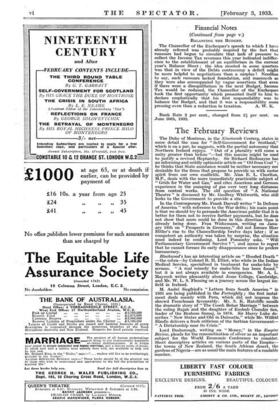The February Reviews
The Duke of Montrose, in the Nineteenth Century, states in some detail the case for " Self-Government for Scotland," which is on a par, he suggests, with the partial autonomy that Northern Ireland enjoys. "Out of a plurality will come a unity greater than before "—but this maxim might be used to justify a revived Heptarchy. Sir Richard Redmayne has an informing and mildly optimistic article on " Oil from. Coal " ; .he thinks that State assistance would be neither necessary nor desirable for the firms that propose to providelis with motor spirit from our own coalfields. Mr. Alan E. L. Chorlton, M.P., deals with the more immediately practicable subject of " Grids for Water and Gas," and cites American and German experience in the pumping of gas over very long distances from central works. The old question of " A National Theatre " is discussed by Mr. Geoffrey Whitworth, who still looks to the Government to provide a site.
In the Contemporary Mr. Frank Darvall writes " In Defence of America " with reference to the War debts ; his main point is that we should try to persuade the American public that it is better for them not to receive further payments, but he _does not show that more could be done in this direction than is already being done. Frau Wiskemann, writing on Janu- ary 18th on " Prospects in Germany," did not foresee Herr Hitler's rise to the Chancellorship twelve days later ; if so competent an authority was taken by surprise, the situation must indeed be confusing. Lord Ponsonby asks, " Will Parliamentary Government Survive ? ", and seems to regret that he cannot foresee its early disappearance since he prefers bureaucracy.
Iffackz000d's has an interesting article on " Hooded Death " —the cobra—by Colonel IL H. Elliot, who while in the Indian Medical Service, specialized in treatment for snake-bite by serums. " A real remedy for snake-bite has been found, but it is not always available in emergencies. Mr. A. L. Maycock writes pleasantly about Jesus College, Cambridge, and Mr. W. L. S. Fleming on a journey across the largest ice- field in Iceland.
M. Andre Siegfried's " Letters from South America " in 1931 are being published in the Fortnightly ; the first instal- ment deals mainly with Peru, which did not impress the shrewd Frenchman favourably. Mr. S. K. Ratcliffe *recalls the dramatic story of " The Cooch Behar Marriage" between the ruling Rajah and the daughter of Keshub Chun* Sea, leader of the Brahmo Samaj, m 1878. Sir Harry Luke de- scribes "New States and Old in Dalmatia," while Mr. Wilfrid Hindle delivers a fresh criticism of the Serbian Government- " A Dictatorship near its Crisis."
. Lord Desborough, writing on " Money," in the Empire Review, pleads for the remonetization of silver as an important subject for the World Economic Conference to consider. Short descriptive articles on various parts of the Empire— the towns of New Zealand, the South African desert, the gardens of Nigeria—are as usual the main features of a readable number.




































 Previous page
Previous page